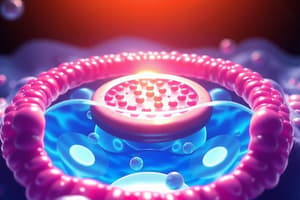Podcast
Questions and Answers
What happens to the rate of reaction as temperature increases towards the optimal level?
What happens to the rate of reaction as temperature increases towards the optimal level?
- The rate of reaction increases due to more collisions between substrate and enzyme. (correct)
- The rate of reaction remains constant due to the energy limitation in the system.
- The rate of reaction decreases because enzymes denature more quickly.
- The rate of reaction becomes unpredictable as the system reaches optimal temperature.
Why does the enzyme denature past the optimal temperature?
Why does the enzyme denature past the optimal temperature?
- The heat alters the chemical bonds within the protein, changing the shape of the active site. (correct)
- The cooling effect causes a structural rearrangement in the enzyme.
- The heat increases the number of active sites available for substrate binding.
- The enzyme becomes more efficient at higher temperatures.
How does pH affect enzymes?
How does pH affect enzymes?
- pH has no effect on enzymes.
- Extremes of pH can denature enzymes by interfering with their chemical structure. (correct)
- High pH levels promote enzyme-substrate complex formation.
- Low pH levels enhance enzyme activity by stabilizing the protein structure.
What happens to the rate of reaction when substrate concentration increases?
What happens to the rate of reaction when substrate concentration increases?
What happens when all enzymes are engaged in enzyme-substrate complexes?
What happens when all enzymes are engaged in enzyme-substrate complexes?
Why do enzymes have an optimal temperature?
Why do enzymes have an optimal temperature?
How does low temperature affect enzyme-substrate interactions?
How does low temperature affect enzyme-substrate interactions?
What occurs when enzymes denature due to high temperatures?
What occurs when enzymes denature due to high temperatures?
Why do pH levels that are too acidic or too alkaline lead to enzyme denaturation?
Why do pH levels that are too acidic or too alkaline lead to enzyme denaturation?
What happens when all enzymes are occupied in enzyme-substrate complexes?
What happens when all enzymes are occupied in enzyme-substrate complexes?
Flashcards are hidden until you start studying




